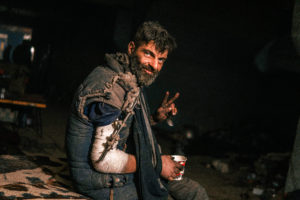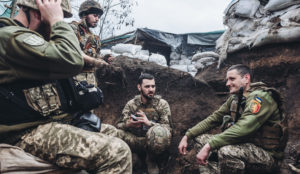Odesa
Mounds of sandbags swaddle blocks of concrete. Soldiers stand in groups of two and three, bored but tense, idling but alert. Checkpoints dominate the streets of central Odesa. “Warning! Mines,” reads a sign in front of an especially fortified post near the city’s Bristol Hotel. Large metal crosses — designed to stop tanks — are scattered in the street. Barbed wire stretches across pavements like bunting.
If war is a plague, then these are its symptoms: pustules and boils that have erupted across Odesa. This is a port city in which the port no longer works. Just miles from the shore, enemy warships are ready to take aim. Every few hours the nasal shriek of an air raid siren tears through the air. Russians are shelling this place from the Crimea, and the Caspian and Black Seas.
The war in Ukraine is over many things. It is not just territory that is at stake here, but language and culture and even history. Nowhere is this truer than with Odesa. Even its name is contested: is it Odes, Odessa, or Odesa? Ukrainians now prefer the latter in Cyrillic with its single s, Russians with two. Over the years, Odesa has been named by its inhabitants in Yiddish, Ukrainian and Russian. It is a city prominent in the Russian imagination. If Moscow is to annex Ukraine to a Greater Russia, it will need Odesa, along with Kyiv, to complete this imperial vision. If Ukraine is to survive as a coherent entity, Odesa cannot fall.
***
“Cosmopolitan, ambivalent, independent and… er… mixed. That’s me. I was born in central Asia to Ukrainian and Belarusian Jews who fled Hitler. My four grandparents were from four different parts of the Soviet Union, but basically I’m a Jew who inherited a Russian passport because we lived in Moscow in the Nineties. But I grew up in America and was educated there and in Europe.”
Vladislav Davidzon, journalist, editor, diarist, dandy, aspiring entrepreneur and my near-constant companion during the early part of my travels in Ukraine, takes a sip of water and continues. “I lived in Odesa for several years and my wife is an Odesan,” he says. “Now I’m back. It’s a lovely time to be Odesa, which is the loveliest city on the entire planet. And I say that without a trace of exaggeration. Probably.”
Vlad is right. Odesa is indeed lovely: the cobbled streets around us are filled with colourful neoclassical houses. But if it manages to be pretty without the chocolate-box banality of certain parts of northern Europe, it’s because there is a certain edge to Odesa. It is many things: a famous city of the Russian Empire; the key to the war’s southern front; but also, like Vlad, it is a place of ambivalence. It resists identification — a city that was, in the words of the author Charles King, “scouted by a Neapolitan mercenary, named by a Russian empress, governed by her one-eyed secret husband, built by two exiled French noblemen, modernised by a Cambridge-educated Count and celebrated by his wife’s Russian lover”.
When Mark Twain visited Odesa in 1867, he saw a place that could take a host of differing nationalities and mould them into something unique: Odesans. This is a city of Russians, Ukrainians, Greeks, Jews and Italians that has been successively governed by the Russian Empire, the USSR, Romania and now Ukraine. But it is also a port city, and port cities are places of darkness. People come here to have affairs, to do drug deals and to kill. Odesa may be an ethnic melting pot, but it is also the site of some of the worst antisemitic pogroms in Russian history (a high bar indeed).
Throughout it all, Odesa has remained discernibly itself: chaotic and oddly removed from any one national story. “Odesa did not have any tradition, but it was therefore not afraid of new forms of living and activity,” said the Odesan and Zionist leader, Vladimir Jabotinsky. He speaks to the city’s final truth: that it belongs to those who want to make themselves anew. It draws in people such as Vlad — a self-conscious product of self-fashioning.
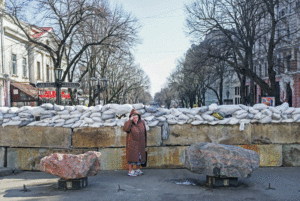
Vlad has come to get his father-in-law out of the country and to safety in Paris with him and his wife. He is also — and he is adamant about this — here to get his tooth fixed, given how good and cheap Ukrainian dentistry is. It was damaged when someone punched him, he tells me. “Was that the guy in Kyiv?” I ask. “No, that was someone else,” he replies. He tells me that he has an NDA in place so cannot go into details. “And anyway,” he adds, “a gentleman does not discuss such matters.”
Things are fraught when we arrive on 15 April. The Russians are slowly making their way down Ukraine’s southern flank. They have almost destroyed the city of Mariupol (it would eventually fall on 20 May) and have taken Kherson, too. Only the neighbouring city of Mykolaiv, which is around 130km east, and which is still holding out, stands between them and Odesa. The land bridge from Russia to Crimea is more or less complete. If they take Odesa, not only can they link up with their separatist statelet of Transnistria in neighbouring Moldova, but they will cut off Ukraine’s access to the sea and strangle Kyiv economically.
So far, the city remains relatively unscathed, though shelling and air raids are frequent. There is also near-constant fear of what Ukrainians call “saboteurs” and “provocateurs” — Russian agents who are either sent in or live among the locals. This is what happens when you fight a nation that looks and speaks exactly like you. It breeds a paranoia that sometimes descends into farce. Odesa is ruled by curfew: no booze after 4pm; no going out after 9pm. The Ukrainian security expert Hanna Shelest sums up the mood: “Last week the security services caught someone skulking around post-curfew. When they grabbed him, he screamed: ‘It’s ok, it’s ok, I’m just a drug dealer!’”
Vlad and I are staying in a hotel in the centre of the city. The reception desk is manned by Aleksandsr, a man of fastidious temperament and bottomless suspicions. I don’t have cash and say I will pay tomorrow morning after I visit an ATM. Aleksandr barks at us in pointed Russian before we leave. “He’s really concerned you’re not going to pay him,” says Vlad to me as we walk out.
Over the next few days, I tramp the streets with Vlad and start to understand exactly what is happening in Ukraine. This is industrial, state-on-state warfare that we have not seen — especially on the European continent — since the Second World War. I was in Ukraine for the beginning of it all in 2014 and everything is now different. At a checkpoint near the Londonskaya Hotel, a soldier, after checking my documents, asks me to delete the photo I have just taken of a nearby building. He even makes me remove it from the “recently deleted” folder on my phone, something which has never happened to me before — in any conflict.
Time passes. The shelling increases. On 23 April, a Russian shell destroys several houses near the city centre and kills a three-month-old baby. But the violence is only half the story. Two things spiral in war: death and rumour. As the weeks roll on and Ukraine pushes Russia back in all directions, fears morph from Russia taking the city to what else an enraged Putin might do in the face of increasing defeat. One afternoon, I have coffee with the Greek-Ukrainian journalist Kostas Onisenko who, much to my surprise, whips out a film camera. I ask if he’s a photography buff. “No, it’s just that maybe there’ll be a nuclear attack here and if so we’re all going to die. I use film because all digital cameras will be fucked but they can find this in the rubble.”
More time passes. The Ukrainians beat back Russian forces from some of the villages surrounding Mykolaiv. Still, Moscow cannot let Odesa go. In late April, Russian commander Rustam Minnekayev announces that Russia’s new offensive goals are to seize control of southern Ukraine, which it palpably cannot do. “The Russians will never give this place up,” Hanna tells me.
***
“[Nationalists] Roman Shukevich and Stepan Bandera are heroes in western Ukraine — that part of the country that believes itself to be the real Ukraine — but not for us. They’re always telling us: ‘You have the wrong values. You don’t walk around wearing Vyshyvanka [traditional dress].’ But they come here and listen to Odesan music and eat Odesan cuisine. They say: ‘You have to put up a statue of Bandera.’ I don’t say: ‘Why don’t you put up a statue of [Odesan gangster] Mishka Yaponchik?’”
Gennadiy Trukhanov, the Mayor of Odesa is keen to set the record straight about Russkiy mir (Russian world). Yes, this may be a Russian-speaking city, he tells me, but Odesans don’t support someone else’s idea of who they should be. This is, after all, a city that erects statues to gangsters. “Just love us the way we are,” he says with a smile.
From here, he moves onto the practicalities. “Today the Ukrainian armed forces have changed their tactics to defend the cities. This time we are not allowing them within 30km so they cannot use their artillery — we will not be making the mistakes of the early part of the war.” Trukhanov understands how critical Odesa is to Moscow. “We believe that Russia has a specific plan for the capture of the city. Odesa has weaknesses; it has one view onto the sea, which is blocked by the occupiers’ naval forces. On our southern flank in Transnistria is the 14th Guards Army of the Russian Federation; in the east is an army which has thus far been stopped at Mykolaiv.” He starts to sketch out how Russia could take the city. “It could only begin if Russia’s land forces broke through the line at Mykolaiv, at which point they would then hit us from the sea too.”
But he remains confident. “Odesans don’t like to be told what to do,” he explains. “We don’t like force. The city is like our women.” I glance at the young lady sitting next to him whose translation skills have been rendered unnecessary by Vlad’s presence. “They may look very open and accessible” —I glance at her again, slightly alarmed this time — “but in fact they are proud and loyal,” he concludes with quiet satisfaction.
***
“50 hryvnia! Do you want my husband to beat me to death?” The trader on the stall is filled with faux indignation as I watch her and Vlad argue over a small 1980 Moscow Olympics badge. We are at the flea market in old Moldovanka, which was once the Jewish quarter. You can get almost anything here: second-hand shoes, skirts, harpoons, typewriters, squash rackets, dolls in varying states of collapse, and a disconcertingly high number of knives and other weapons.
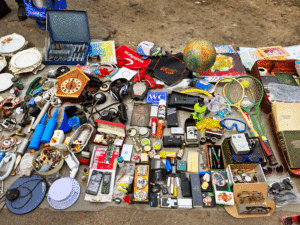
Vlad, it soon becomes clear, adores haggling. “You haggle better than an Odesan,” the lady tells him with respect. The market is real Odesa: a city of peddlers and hustlers and con artists; a mix of the USSR and Russia and Ukraine and Judaism — all spread out across the streets and, critically, for sale. We go to leave and a stallholder calls out to Vlad: “Does your British friend want an axe?”
We dash off to see a local artist, Stas Zhalobniuk, who Vlad wants to meet. He is selling paintings about the war that are visually striking, politically attuned and that Vlad reckons he can knock-out for a profit in Brooklyn. The next day it is finally time for Vlad to fix his tooth. He leaves me at a restaurant to work. I look at the table in front of me. It contains the detritus of a month spent across the battlefields of Ukraine: four notebooks, an assortment of pens and pencils, several strange-looking cables, my helmet, and, propped up against a teapot, a large X-ray of Vlad’s teeth.
Two hours later he returns. He has, right in the front of his mouth, a new and gleaming white incisor. The only problem is that it’s longer than all the others. “Vlad, what the fuck?” I ask. “You noticed?” “Of course,” I tell him.
“Yeah, they actually had an argument about it. The technician came and said ‘I think it’s kind of long’ but the dentist said it was fine. Anyway, they’re going to have to file it down but the guy that normally does it is away fighting so I’ll have to wait.”
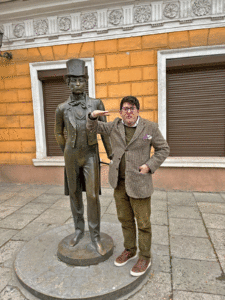
A few days later, it’s time for Vlad to leave. That evening, I enter the lobby of my hotel to see the receptionist waving at me . “Your friend was here, sir,” she says, “Which one? I ask. “He dropped off a painting for you.” “Ah, I see, Vlad.”
“Yes, sir. The one with the tooth.”
***
To understand Vlad you need to be aware of his father. Grigory Davidzon was a Soviet tough guy who left the USSR in 1989 with his wife and ended up in New York’s Little Odesa, where he became a local media tycoon, kingmaker, fixer and quasi-Don, controlling much of the vote in his district. He wanted a son who would go into the family businesses. Instead he got Vlad: a gallivanting fop who favours floral cravats, Romantic poetry and yellow espadrilles.
It was not a good relationship. They did not even leave Russia together. Vlad instead escaped with his grandmother on the last flight out of the Soviet Union on the morning of the attempted coup against Boris Yeltsin on 18 August 1991. Grigory — who lost his own father to a political assassination in Uzbekistan — was demanding, controlling and authoritarian. Vlad was determined not to submit. And that is perhaps the most Odesan characteristic of all.
“Moscow wants Odesa so much because it had a central place in the culture and art and literature of the Russian 19th century,” Vlad told me. “Pushkin started writing poetry here, every famous Russian writer and composer passed through here — and passed out from drinking at the Londonskaya hotel.”
Now Ukraine is — understandably — determined to de-Russify the country. There is talk of removing all the Pushkin statues and memorabilia from the country. But Odesa without Pushkin is no longer Odesa. It is something else. And this speaks to a larger truth: The city is now caught between Moscow’s imperialism and, from some quarters, a counterforce that would seek to make it something it is not and has never been. If Odesa is to have a future as the city it has always been, it must resist those forces as ferociously as the Russian aggression it has faced every day of this war.
Disclaimer
Some of the posts we share are controversial and we do not necessarily agree with them in the whole extend. Sometimes we agree with the content or part of it but we do not agree with the narration or language. Nevertheless we find them somehow interesting, valuable and/or informative or we share them, because we strongly believe in freedom of speech, free press and journalism. We strongly encourage you to have a critical approach to all the content, do your own research and analysis to build your own opinion.
We would be glad to have your feedback.
Source: UnHerd Read the original article here: https://unherd.com

